MODULE SEVEN
同步讲义 Module 7 Unit 2(学生版)

同步讲义 Module 7 Unit 2词汇1. boss 老板2. secretary [ˈsekr ətri] 秘书3. quarter [ˈkw ɔ:t ə(r)] 四份之一4. industry [ˈɪnd əstri] 工业5. zero [ˈz ɪər əʊ] 零6. Indian 印度人;印度的7. type [ta ɪp] 种类句子1. In Ghana, India and Singapore, English is used as a working language, for example, between bosses and secretaries, and between doctors and patients, although there are other languages for everyday use. 在加纳、印度和新加坡,虽然日常生活中人们也使用其他语言,但还是把英语作为一种工作语言来使用。
2. English is now used by nearly a quarter of the world ’s population, and anywhere you go in the world, there is a good chance that you will meet someonewho speaks English. 目前全世界约四分之一的人口都在使用英语,无论你走到世界的哪个角落,都很有可能碰到说英语的人。
3. The reason why English is spoken everywhere is that in the nineteenth century, English became the language of world trade. 各地都说英语的原因是,在19世纪,英语成为了世界贸易用语。
4. Even though we speak different types of English, we are all part of an international club. 虽然我们说着各式各样的英语,但我们都是国际俱乐部的一员。
五年级下册英语外研版Module7模块知识梳理卷(含答案)

Module7模块知识梳理卷班级__________姓名__________得分__________时间:30分钟满分:100分基础知识梳理一、单词过关(英汉互译)(9分)1.傍晚,晚上2.近深夜的3.工人4.早的5.出租车6.焦虑,担心7.quarter8.factory9.(距整点)差……二、核心短语(英汉互译)(10分)1.在八点2.在一家工厂里3.迟到4.一名出租车司机5.几点6.在五点半7.差一刻钟到……8.go to work9.every evening10.a quarter past three三、重点句子(汉译英)(12分)1.他是做什么工作的?2.她是一名出租车司机。
3.我爸爸每天晚上六点钟去上班。
My father__________to work__________six o’clock____________________.4.你将几点到家?____________________will you__________home?5.现在八点半了。
It’s______________________________now.6.我将在七点钟到家。
四、核心语言点(14分)本模块在学习现在时和将来时的基础上,学习了有关职业的表述,还谈论了活动,行为或事件发生的时间,补全下列单词,完善本模块信息。
模块强化检测五、判断下列单词是(T)否(F)属于同一类。
(5分)()1.A.worker B.driver C.early()2.A.evening B.morning C.afternoon ()te B.car C.taxi()4.A.factory B.school C.to()5.A.worry B.take C.start六、单项选择。
(10分)()1.He will__________to the library.A.goesB.goC.went()2.I get up__________half past six.A.inB.atC.to()3.Her mother is a__________.A.drivesB.driveC.driver ()4.What__________his sister do?A.doesB.doC.is ()5.Are you going to__________?A.dancingB.danceC.danced七、选词填空。
六年级第一学期英语单词 (3)

六年级第一学期英语单词Module 1名词kilometer 公里,可以place 地方,地点building建筑物metre 米数词million百万,百万个thousand一千动词might 可能短语the Summer Palace 颐和园how old 多久the Great Wall 长城how long 多长more than …多Module2名词Chinatown 唐人街dancing 舞蹈restaurant 饭馆weekend 周末yesterday 昨天stone 石头surprise 惊奇动词might 可能副词everywhere 各处到处形容词different 不同的短语the Ming Tombs 明陵(十三陵)New York 纽约Module3名词stamp 邮票album 集邮册America 美国Canada 加拿大coconut 椰子England 英格兰动词collect 收集形容词favourite 最喜爱的Module4名词present 礼物festival 节日Thanksgiving 感恩节Christmas 圣诞节poem 诗动词hear 听到听见形容词special 特殊的,特别的important 重要的副词nearly 几乎接近差不多together 一起Module 5名词address 地址summer 夏天形容词pretty 漂亮的pleased 高兴的,满足的foreign 外国的短语pen pal 笔友Module6名词chopsticks 筷子city 城市question 问题knife 刀fork 叉子sandwich 三明治动词answer 回答finish 完成结束start 开始形容词difficult 困难的短语half past …点半Module 7名词bamboo 竹子child 孩子snake 蛇flute 笛子动词copy 模仿sleep 睡觉形容词awake 醒的deaf 聋的短语CD-ROM 电脑光盘at night 在晚上come out 出来Module 8 名词bookshelf 书架week 星期,周副词often 常常,经常动词tidy 整理,收拾choose 选择形容词messy 脏乱的短语every week 每周tidy the room 整理房间suck one’s thumb 嘬手指read books 读书go to the library 去图书馆Module 9 名词peace 和平world 世界kangaroo 袋鼠children 孩子们parrot 鹦鹉动词visit 参观介词inside 在…之内短语the UN building 联合国大厦make peace 维持和平in the world 在世界上Module 10 名词way 方式,方法line 排,列形容词thirsty 口渴的beautiful 美丽的动词bring 拿来,带来短语have a picnic 野餐of course 当然drink water 喝水be quite 安静stand in line 站队六年级第一学期英语句型Moudle One 1. How long is the Great Wall? 长城有多长?It’s ten thousand li long. 它有万里长。
外研版八年级英语上册Module 7Unit3 课件

Mad Hatter: And be quick. Or you'll be asleep again before it's done. Mouse: Once upon a time, there were three little sisters, and they
lived... March Hare: Take some more tea. Alice: I didn't have any tea, so I can't have more. Mad Hatter: You mean you can't take less. It's very easy to take more
more than three people. ④ Mad Hatter: That's because it's always tea time. Alice: I don't understand.
Mad Hatter: We don't have time to wash the things... March Hare: So we just move round the table...
6. Complete the passage with the words in the box.
conversations hole pink pocket river strange
Alice was sitting with her sister by the (1)___r_iv_e_r__ and her sister was reading a book. Her sister's book had no pictures or (2)___c_o_n_v_e_r_sa_t_io__n_s___in it.
六年级下册英语书外研版第七模块作文
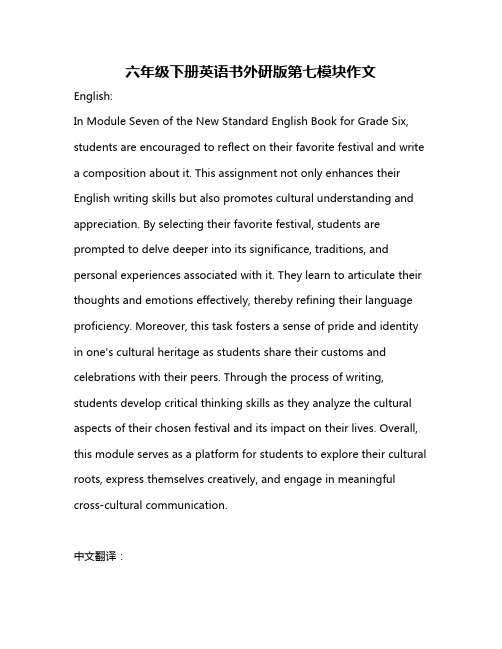
六年级下册英语书外研版第七模块作文English:In Module Seven of the New Standard English Book for Grade Six, students are encouraged to reflect on their favorite festival and write a composition about it. This assignment not only enhances their English writing skills but also promotes cultural understanding and appreciation. By selecting their favorite festival, students are prompted to delve deeper into its significance, traditions, and personal experiences associated with it. They learn to articulate their thoughts and emotions effectively, thereby refining their language proficiency. Moreover, this task fosters a sense of pride and identity in one's cultural heritage as students share their customs and celebrations with their peers. Through the process of writing, students develop critical thinking skills as they analyze the cultural aspects of their chosen festival and its impact on their lives. Overall, this module serves as a platform for students to explore their cultural roots, express themselves creatively, and engage in meaningful cross-cultural communication.中文翻译:在外研版六年级英语书的第七模块中,学生被鼓励反思他们最喜爱的节日,并就此写一篇作文。
Module Seven
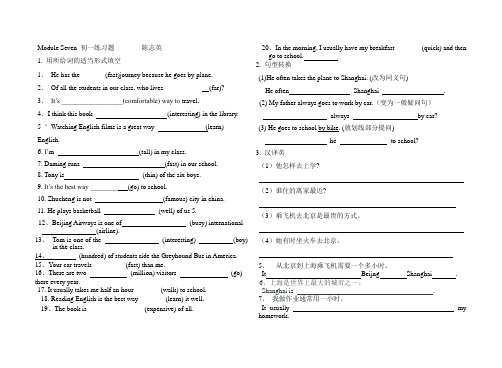
Module Seven 初一练习题陈志英1. 用所给词的适当形式填空1.He has the _______(fast)journey because he goes by plane.2.Of all the students in our class, who lives ___________ (far)? 3.It’s __________________(comfortable) way to travel.4.I think this book (interesting) in the library.5‘Watching English films is a great way (learn) English.6. I’m (tall) in my class.7. Daming runs (fast) in our school.8. Tony is (thin) of the six boys.9. It’s the best way ________(go) to school.10. Zhucheng is not (famous) city in china.11. He plays basketball (well) of us 5.12、Beijing Airways is one of (busy) international(airline).13、Tom is one of the (interesting) (boy)in the class.14、(hundred) of students ride the Greyhound Bus in America.15、Your car travels _________ (fast) than me.16、There are two (million) visitors (go) there every year.17. It usually takes me half an hour _______ (walk) to school.18. Reading English is the best way _______ (learn) it well.19、The book is ________________ (expensive) of all.20、In the morning, I usually have my breakfast _______ (quick) and thengo to school.2. 句型转换(1)He often takes the plane to Shanghai. (改为同义句)He often Shanghai .(2) My father always goes to work by car.(变为一般疑问句)always by car?(3) He goes to school by bike. (就划线部分提问)he to school?3. 汉译英(1)他怎样去上学?(2)谁住的离家最近?(3)乘飞机去北京是最贵的方式。
小学英语外研版(三起)五年级下Module7 本模块综合与测试-章节测试习题(1)

章节测试题1.【答题】I'm ______. I want ______ ice cream.A. cold; anB. hot; anC. hot; a【答案】B【分析】本题考查形容词词义辨析和冠词的用法。
【解答】根据句意:我想要冰淇淋可推断,前面应该是我很热。
cold冷的,hot热的。
ice cream是以元音音素开头的,因此用冠词an。
选项B符合句意,选B.2.【答题】选词填空。
have breakfast goes to work be home a busy man a quarter to eightIt's ______ now. I'll be late for school.What time will you ______?My father is ______.Do you ______ at seven every morning?He often ______ by bus.【答案】a quarter to eight,be home,a busy man,have breakfast, goes to work【分析】本题考查选词填空。
【解答】1. 考查时间表达,a quarter to eight意为7:45,与late相呼应,符合句意,故选a quarter to eight。
2. 考查will be句型,will……be表示将要,home是在家,在此处符合句意,故选be home。
3. 考查名词,a busy man意为忙碌的人,整句意为:我爸爸很忙碌。
故选a busy man。
4. 考查动词词组,have breakfast意为吃早饭,故选have breakfast。
5. 考查动词短语及其三单形式,根据主语he得知主语是第三人称单数,其后所跟动词也要用三单形式,goes to work意为去工作,在此处符合语境,故选goes to work。
外研版五年级英语下册Module 7 综合素质评价含答案

外研版五年级英语下册Module 7综合素质评价一、听句子,选出你所听到的单词。
(5分)()ke te C.quarter()2.A.work B.evening C.worker()3.A.early B.taxi C.worry()4.A.to B.too C.two()5.A.hurry B.carry C.factory二、听句子或对话,给下列图片排序。
(5分)() () () () ()三、听对话,根据所听内容,选择正确的答案。
(10分)()1.Mary’s mother is a .A.teacherB.farmerC.doctor()2.Dad will be home at .A.half past sevenB.seven o’clockC.a quarter to seven()3.They will go to school .A.on footB.by school busC.by taxi()4.Mary’s father goes to work at .A.half past five every morningB.twenty past five every morningC.a quarter to five in the afternoon()5.Today is .A.Mother’s DayB.Lily’s mum’s birthdayC.Children’s Day四、听短文,根据所听内容在下列表格中相应位置打“√”。
(10分)MotherAuntFatherUncleMary五、根据图片及首字母提示补全单词。
(5分)第1题图第2题图第3题图第4题图第5题图1.My father is a t driver.2.It’s a q past three.We’re taking a PE class.3.This is a f .My brother works there.4.I often go home in the e after school.5.My uncle is a w .He works very early in the morning.六、选词填空,补全句子。
外研版英语八年级上册Module 7知识点总结+习题.(无答案)

Module 71.follow = go / come after 跟随follow sb. to do sth. 跟随某人做某事(1)Speak more slowly, I you. 说慢点,我跟不上。
(2)Please read the story. 请跟我读这个故事。
(3)还可以意为"遵守" We must follow the school rules.2.fall down 跌倒fall 过去式(1)She and her leg yesterday. 昨天她摔倒跌伤了腿。
(2)fall down 跌倒,倒下fall off 跌落,从…掉下来fall asleep 睡着fall into 落入,掉入(3)The girl the bike and hurt her head.A fell down B.got out of C. fell off D.got Into3.once or twice 一两次,偶尔he to school. 他偶尔步行上学。
表示次数:one, twice, three times, four times, … (三次或以上用“数词+ times”) 4.hear sb. do sth. 听见某人做了某事hear sb. doing sth. 听见某人正在做某事eg: (1) I heard her (play) the piano in the room just now.(2) I heard them (sing) in the next room when I passed by.(3) He heard a girl (cry)on his way home.5.see sb. do sth. 看见某人做某事see sb. doing sth. 看见某人正在做某事eg: (1) 我经常看见他们打篮球。
I often basketball.(2) 我看见清洁工在扫地。
小学英语外研版(三起)四年级下Module7 本模块综合与测试-章节测试习题(2)
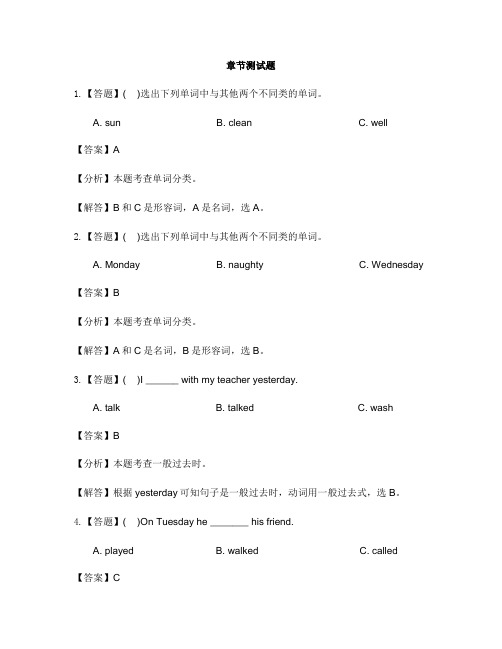
章节测试题1.【答题】( )选出下列单词中与其他两个不同类的单词。
A. sunB. cleanC. well【答案】A【分析】本题考查单词分类。
【解答】B和C是形容词,A是名词,选A。
2.【答题】( )选出下列单词中与其他两个不同类的单词。
A. MondayB. naughtyC. Wednesday 【答案】B【分析】本题考查单词分类。
【解答】A和C是名词,B是形容词,选B。
3.【答题】( )I ______ with my teacher yesterday.A. talkB. talkedC. wash【答案】B【分析】本题考查一般过去时。
【解答】根据yesterday可知句子是一般过去时,动词用一般过去式,选B。
4.【答题】( )On Tuesday he _______ his friend.A. playedB. walkedC. called【答案】C【分析】本题考查动词辨析。
【解答】played玩;walked走;called打电话;根据句意:周二他___他的朋友。
可知called符合语境,选C。
5.【答题】( )--_______ did they do last Sunday?--They listened to music.A. WhatB. HowC. Do【答案】A【分析】本题考查特殊疑问句。
【解答】What什么;How怎样;Do助动词,根据答语:他们听音乐了。
可知问句问做什么了,选A。
6.【答题】( )Amy and Lingling _______ basketball last week.(上周)A. playB. playedC. cooked 【答案】B【分析】本题考查一般过去时。
【解答】play basketball打篮球,根据last week可知句子是一般过去时,选B。
7.【答题】( )Yesterday _______ a holiday.A. isB. wasC. were【答案】B【分析】本题考查动词的过去式。
最新初中英语外研版八年级下册八下Module7 模块测试题及答案
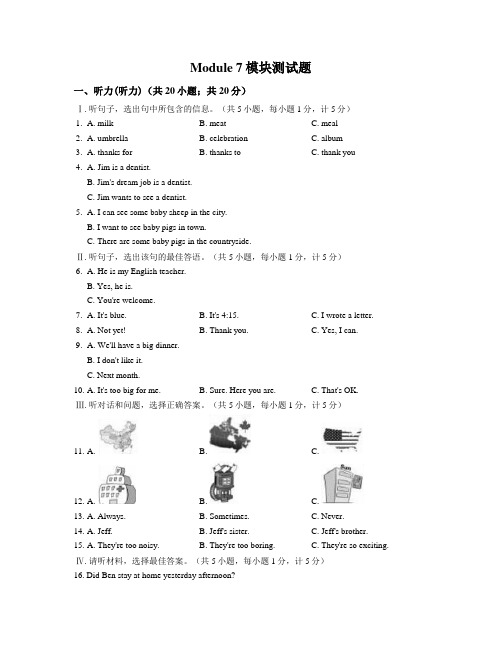
Module 7模块测试题一、听力(听力)(共20小题;共20分)Ⅰ. 听句子,选出句中所包含的信息。
(共5小题,每小题1分,计5分)1. A. milk B. meat C. meal2. A. umbrella B. celebration C. album3. A. thanks for B. thanks to C. thank you4. A. Jim is a dentist.B. Jim's dream job is a dentist.C. Jim wants to see a dentist.5. A. I can see some baby sheep in the city.B. I want to see baby pigs in town.C. There are some baby pigs in the countryside.Ⅱ. 听句子,选出该句的最佳答语。
(共5小题,每小题1分,计5分)6. A. He is my English teacher.B. Yes, he is.C. You're welcome.7. A. It's blue. B. It's 4:15. C. I wrote a letter.8. A. Not yet! B. Thank you. C. Yes, I can.9. A. We'll have a big dinner.B. I don't like it.C. Next month.10. A. It's too big for me. B. Sure. Here you are. C. That's OK.Ⅲ. 听对话和问题,选择正确答案。
(共5小题,每小题1分,计5分)11. A. B. C.12. A. B. C.13. A. Always. B. Sometimes. C. Never.14. A. Jeff. B. Jeff's sister. C. Jeff's brother.15. A. They're too noisy. B. They're too boring. C. They're so exciting. Ⅳ. 请听材料,选择最佳答案。
外研版八下Module7模块七综合检测试题含答案

外研八年级下学期Module7试题Class: Name: Marks:〔总分值100分〕Ⅰ. 单项选择(15分)从以下各题所给的A、B、C和D四个选项中,选择可以填入空白处的最正确选项。
( ) 1. We took trip to the Great Wall last weekend and trip made us very excited.A. a; aB. the; aC. a; theD. the; the ( ) 2. A person who will travel to a foreign country must carry a .A. dictionaryB. passportC. ticketD. notebook ( ) 3. Each of the girls got a small gift the end of the party last night.A. inB. onC. offD. at( ) 4. —How long will the summer English courses "—For six weeks.A. lastB. openC. beginD. start( ) 5. —Mum, look! My trousers short. Can you buy me a new "—OK.A. is; pairB. were; oneC. are; pairD. is; one ( ) 6. —Shall we go for a piic tomorrow"—Well, it all the weather.A. gets onB. puts onC. tries onD. depends on ( ) 7. —Our school bus will leave at 8 o’clock tomorrow. Don’t be late.—OK. I will be there ten minutes .A. soonerB. slowerC. earlierD. faster( ) 8. —I will go to Harbin for my holiday. What about you"—I haven’t decided where .A. goB. wentC. goingD. to go( ) 9. —Don’t forget to call me when you arrive there.—.A. No, I won’tB. Yes, I haveC. You’re weleD. No, thanks( )10.—The meat is delicious.—Yes, but don’t eat . It’s not good for your health.A. too much; too muchB. much too; too muchC. too much; much tooD. much too; much too( )11.—Tom, may I use your pen to the application (申请) form"—Sure. Here you are.A. fill outB. pay forC. count downD. e out( )12. The little girl her seat to an old lady on the crowded bus yesterday.A. madeB. gotC. offeredD. brought( )13. I think the actor is famous, none of my friends has ever heard of him.A. andB. orC. soD. but( )14. Plan your time carefully and make sure you have more time what you like every day.A. doB. to doC. doingD. done( )15.—Goodbye, Linda. .—Bye, Mike! I’ll write to you.A. Keep fitB. With pleasureC. Sounds greatD. Stay in touchⅡ. 完形填空(10分)先通读下面短文,掌握其大意,然后从每题所给的四个选项中选出最正确选项。
外研社八年级英语上册Module7 知识点
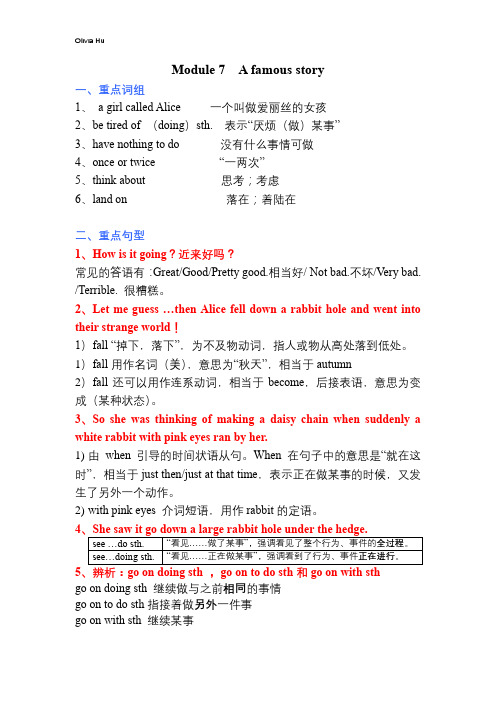
Module 7 A famous story一、重点词组1、a girl called Alice 一个叫做爱丽丝的女孩2、be tired of (doing)sth. 表示“厌烦(做)某事”3、have nothing to do 没有什么事情可做4、once or twice “一两次”5、think about 思考;考虑6、land on 落在;着陆在二、重点句型1、How is it going?近来好吗?常见的答语有:Great/Good/Pretty good.相当好/ Not bad.不坏/Very bad. /Terrible. 很糟糕。
2、Let me guess …then Alice fell down a rabbit hole and went into their strange world!1)fall “掉下,落下”,为不及物动词,指人或物从高处落到低处。
1)fall用作名词(美),意思为“秋天”,相当于autumn2)fall还可以用作连系动词,相当于become,后接表语,意思为变成(某种状态)。
3、So she was thinking of making a daisy chain when suddenly a white rabbit with pink eyes ran by her.1)由when 引导的时间状语从句。
When在句子中的意思是“就在这时”,相当于just then/just at that time,表示正在做某事的时候,又发生了另外一个动作。
2)with pink eyes 介词短语,用作rabbit的定语。
45、辨析:go on doing sth ,go on to do sth和go on with sthgo on doing sth 继续做与之前相同的事情go on to do sth指接着做另外一件事go on with sth 继续某事6、There was nothing strange about that.nothing strange意为“没有什么好奇怪的”,nothing为不定代词,strange是修饰nothing的后置定语。
七年级上册英语第七单元课文

外研版英语七年级上册Module 7 ComputersUnit 1 How do I write my homework on the computer ?Lingling:How do I write my homework on the computer ?Can I learn ?Betty :Sure!First, open a new document . Click the mouse on “ new document “.Lingling : What’s the mouse ? Is this it ?Betty:Yes.Lingling : Where do I click on “new document”?Betty :On the left of the screen ……there!Lingling : OK, what’s next?Betty:Next,you write your homework in the new document . Use the keyboard .Lingling: What do I do next ? How do I save the document ?Betty: You click “save “ , and write a name for it .Lingling :Where do I write the name ?Betty: Write it in the box . OK, then click “save” again .Lingling : OK. How do I print my document ?Betty:Click “print” and “OK” .Lingling : What about some paper ?Betty:Oh yes , of course ! You put the paper in there first !Unit 2 When do you use a computer ?There is a computer in my home , and my father and I share it . My father is a manager of a company , so he often talks to his customers on the computer . He also goes on the internet to check the times of trains , make travel plans , and buy tickets .I listen to music or watch movies on it every Friday night .-Zhang Lei There is no computer in my home . I can only use it at school . On the Internet , I search for information , do my homework and check my email . I have a friend in Australia. I can see her and talk to her on the Internet .-AliceWe have a computer at home . My parents don’t use it . I can use it on Sundays . I send email to my friends and play computer games . But sometimes I play a lot of games and my mother doesn’t like it.-Mike。
Module 7 Unit 2 I will be home at seven o'clock.

1. Listen, then put the pictures in the correct order.
Work in pairs.
课后反思
如何突破
教学难点
师生之间相互问候,让学生回忆写信的格式,通过课文中的图片引导学生学习如何发送电子邮件。
需要识记和特
别强调的问题
熟记本课新单词,口头运用所学句型。
板书设计
Module 7 Communications
Unit 2 I will be home at seven o’clock.
Office I am working very hard at the office.
Nice to meet you too.
I am fine, thank you. And you.
Say the time.
Read your‘Email’
Read the text.
Get the students listen and find the new words.
Listen and repeat.
2. Revise the times. Show theabig clock.
1. Read your“Email”.
2. Read the text.
1. Show the Email. Play the tape .
2. Play the tape again.
3. Play the tape.
Get the students listen and repeat.
Divide the class into boys and girls .Put the boys on one side of the class and the girls on the other.
外研版英语八年级上册Module7 重点句子汇总
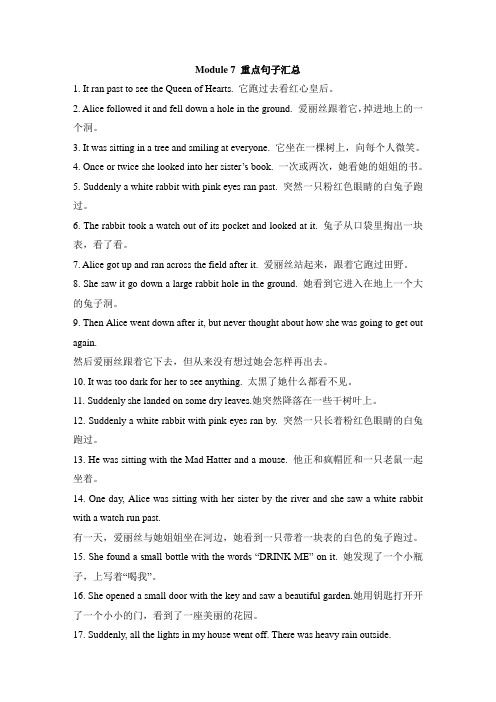
Module 7 重点句子汇总1. It ran past to see the Queen of Hearts. 它跑过去看红心皇后。
2. Alice followed it and fell down a hole in the ground. 爱丽丝跟着它,掉进地上的一个洞。
3. It was sitting in a tree and smiling at everyone. 它坐在一棵树上,向每个人微笑。
4. Once or twice she looked into her sister’s book. 一次或两次,她看她的姐姐的书。
5. Suddenly a white rabbit with pink eyes ran past. 突然一只粉红色眼睛的白兔子跑过。
6. The rabbit took a watch out of its pocket and looked at it. 兔子从口袋里掏出一块表,看了看。
7. Alice got up and ran across the field after it. 爱丽丝站起来,跟着它跑过田野。
8. She saw it go down a large rabbit hole in the ground. 她看到它进入在地上一个大的兔子洞。
9. Then Alice went down after it, but never thought about how she was going to get out again.然后爱丽丝跟着它下去,但从来没有想过她会怎样再出去。
10. It was too dark for her to see anything. 太黑了她什么都看不见。
11. Suddenly she landed on some dry leaves.她突然降落在一些干树叶上。
12. Suddenly a white rabbit with pink eyes ran by. 突然一只长着粉红色眼睛的白兔跑过。
- 1、下载文档前请自行甄别文档内容的完整性,平台不提供额外的编辑、内容补充、找答案等附加服务。
- 2、"仅部分预览"的文档,不可在线预览部分如存在完整性等问题,可反馈申请退款(可完整预览的文档不适用该条件!)。
- 3、如文档侵犯您的权益,请联系客服反馈,我们会尽快为您处理(人工客服工作时间:9:00-18:30)。
MODULE SEVEN
UNIT 1
1.accessible,可接近的,
be accessible to
the access to
可以接近的
接近· · · · · 的方法
get\have access to
接近· · · · · 的机会
他们有一些公众无法接触的文件。
they have some documents not accessible to the public.
be suitable to do sth 适合做· · · · · · suit oneseif 随自己的意思做事 be suit for/to do sth 适合做某事 穿这套衣服适合参加汤姆的婚礼。 the dress is suitable to wear to tom's wedding. 这套房子确实不适合大家庭住。 the house is not really suitable for a large familiy.
7,circumstance 环境,状况,事件
according to circumstances 视情况而定
in easy circumstances 舒适
in needy circumstances 穷困 in present circumstances 在目前这种情况 in /under no circumstances 绝不 你无论如何都不该把钱借给他。 under no circumstances should you lend him any money.
8.sacrifice,牺牲。献祭,廉价卖出
sacrifice· · · · · for 为· · · · · 牺牲
sacrifice````to 向· · · · · 献祭 at a sacrifice 亏本的 at the sacrifice of``` 牺牲· · · · make a sacrifice for```为· · · · · 做出牺牲 他愿意为和平作出任何牺牲。 he was willing to make any sacrifice for peace.
10,keep pace with步调一致
at a pace 以· · · · · 步伐
露西迈着悠闲地步伐返回宾馆。 lucy set off at a leisurely pace back to the hotel. 工资上涨往往赶不上通货膨胀的速度。 salaties pave not always kept pace with inflation.
学生要有使用好图书馆的机会。 studehts must have access to a good library.
2.oppose 反对,反抗,与某人较量
oppose sth to \against sth 使某一事物与另一事物对比
oppose sth\doing sth \sb doing sth 反对某事/做某事/某 人做某事 be opposed to sth 反对· · · · · · · 他反对修建新礼堂的建议。
4.distribute 分配 发放,散发
distribute sth to \among sb 向ห้องสมุดไป่ตู้人/在· · · · · 之间发放某物
distribute sb over 把· · · · 散布了 have a wide distribution 分布广泛 示威者向行人发放传单。 the demonstrators distributed leaflrts to passers-by. 松树分布广泛。 pines have a vevy wide distribution
9.keep in touch with 与· · · · 保持联系
be in touch with 与· · · · 有联系
get in touch with 与· · · · 取得联系 get out of/lose touch with 与· · · · 失去联系 stay in touch with sb 与某人保持联系 我认为你已经脱离了实际。 i think you have lost touch with reality.
5.delay, 推迟,延误
delay doing sth 推迟做某事 without delay 立即 admit of no delay 刻不容缓 a delay in dong sth 做· · · · · 耽搁了 寻求帮助有些晚了。 there was some delay in asking for help. 他们本来应该午饭时间到的,但他们的航班延误了。 they should have arrived at lunchtime but their flight was delayed.
accessible
oppose suitable distribute delay
obvious
circumstance sacrifice keep in touch with keep pace with
studehts must have access to a good library.
she seems vevy much opposed to your going obroad.
the house is not really suitable for a large familiy. pines have a vevy wide distribution they should have arrived at lunchtime but their flight was delayed. it is obvious that he didn't do it himself . under no circumstances should you lend him any money he was willing to make any sacrifice for peace. i think you have lost touch with reality. salaties pave not always kept pace with inflation.
he opposed the proposal to build a new hall.
她好像反对你出国
she seems vevy much opposed to your going obroad.
3.suitable 合适的,适当的
be suitable for 对· · · · · · 合适
6.obvious 明显的,显而易见
it is obvious that
· · · · · · 是显而易见
for obvious reasons 由于显而易见的原因 他显然对她撒了谎。 he told her an obvious lie. 他显然没有亲自去做。 it is obvious that he didn't do it himself .
